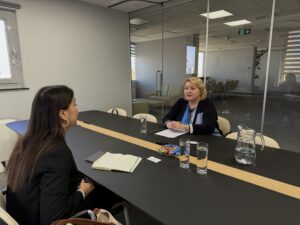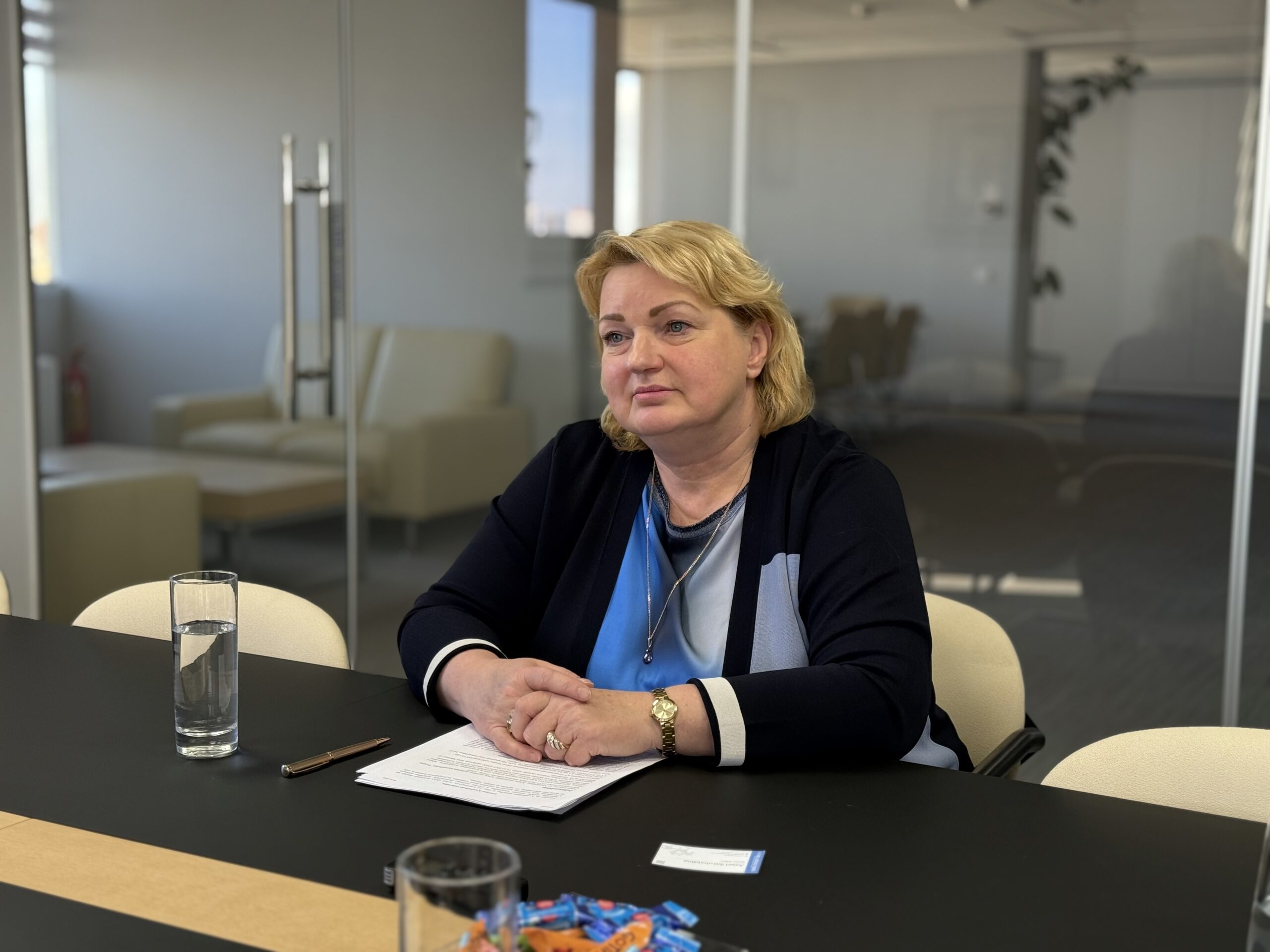ASTANA – Latvia is prioritizing deeper collaboration with Kazakhstan to find common ground on how to strengthen security and mutual understanding on the Eurasian continent, said Irina Mangule, Ambassador of Latvia to Kazakhstan, in a recent interview with The Astana Times.
Mangule began her mission in 2021 when the world was grappling with the consequences of the COVID-19 pandemic and when even bilateral ties had been affected.
“Of course, we built upon the ‘tracks’ that were already laid before us—our good neighborly relations. After all, we share only one neighbor. (…) Fundamentally, we are part of the same continent – Eurasia. Europe and Asia are separated only virtually, so I believe we are quite close as countries and understand each other well. That is why I came here confident that I would be understood, that I would find friends and that we would succeed in revitalizing everything we share,” said Mangule.
Maintaining peace is a priority
The ambassador explained that in the face of a complex geopolitical situation, Latvia places great emphasis on aligning with the European Union’s collective foreign policy. Within this shared framework, each country in the bloc sets its priorities. For Latvia, these priorities include fostering mutual understanding and building security in a shared Eurasian context.

Irina Mangule, Ambassador of Latvia to Kazakhstan and The Astana Times Senior Editor Assel Satubaldina. Photo credit: The Astana Times
“The primary priority is to find common ground with Kazakhstan, ensuring mutual understanding on how to build security together on our shared continent. This, for me, is the most important goal. From this priority stems the effort to develop economic ties, which are naturally crucial for both Kazakhstan and Latvia. Kazakhstan is our most significant trading partner in Central Asia and a very important partner in transport and logistics,” said Mangule.
According to the Kazakh Bureau of National Statistics, bilateral trade was $356.1 million in 2023, demonstrating a 63% growth. Kazakh exports were $278.9 million. The first nine months of 2024 brought the trade to $173 million.
Data from the Kazakh Foreign Ministry indicate that 145 legal entities with Latvian capital in Kazakhstan exist as of January 2024. Latvian investments in Kazakhstan have reached $276.4 million since 2005.
There are also 100 Kazakh companies registered in Latvia, engaged in logistics, trade, and financial consulting.
In May, Riga hosted the ninth meeting of the Kazakhstan-Latvia Intergovernmental Commission on Economic, Scientific, and Technical Cooperation. Kazakh and Latvian officials discussed how the two countries can expand trade and explored opportunities for joint investment projects, including in transport and logistics, agro-industry, digitalization, education, and tourism.
Finding a mutual understanding is therefore essential so that Latvia, Kazakhstan, and the EU can work together to maintain peace in the region.
Transport and logistics
Ambassador Mangule highlighted the importance of transportation and logistics in the economic relationship between Latvia and Kazakhstan, framing them as more than just a means of moving goods. She emphasized that logistics firms are integral to the business ecosystem, and every train or truck carrying cargo—regardless of whether it originates from Kazakhstan, China, or elsewhere—represents a business in its own right.
Ambassador Mangule stressed the importance of preventing not just conventional smuggling in transportation and logistics but also efforts to circumvent sanctions.
In May, Kazakh Minister of Transport Marat Karabayev paid an official visit to Riga, where he and his Latvian counterpart Kaspars Briškens signed a memorandum on the development of the Trans-Caspian International Transport Route.
Mangule said that Latvian ports are vital gateways for delivering Kazakh goods to European markets and beyond. She emphasized that the collaboration between Latvian ports and Kazakh companies is a cornerstone of their economic partnership, focusing on strengthening and revitalizing these connections. She also noted the big interest of Kazakh companies in exporting their products to Europe.
Speaking of Latvia’s engagement in the region of Central Asia, Mangule pointed to the EU’s Border Management Program in Central Asia (BOMCA), where Latvia’s State Border Guard is a key implementing agency. It is a flagship initiative aimed at enhancing security, stability, and sustainable development in the Central Asian region. Launched in 2003, BOMCA focuses on strengthening border management systems, facilitating trade, and combating illegal activities such as drug trafficking.
Digitalization is a promising area
The ambassador discussed ongoing efforts to finalize a memorandum of cooperation in IT between Kazakhstan and Latvia. She said the project is in its developmental stages, requiring both sides to carefully identify specific areas for collaboration.
Mangule commended Kazakh banks for their pioneering role in digital and fintech services. She suggested it would position Kazakhstan not only as a regional leader but as a global pioneer in digital banking services.
Cultural exchanges
Mangule highlighted the growing cultural exchanges between Kazakhstan and Latvia. She mentioned the success of a recent concert by a folklore ensemble of the Atyrau Regional Philharmonic at the Splendid Palace cinema in Riga. “The ensemble’s performance received overwhelming applause,” she added.
The Nov. 21 event, dedicated to celebrating Latvia’s Independence Day, featured Latvian singer Katrīna Gupalo performing a repertoire that included songs by Latvia’s most iconic composer, Raimonds Pauls. His songs are well-recognized in Kazakhstan, too.
Mangule shared her enthusiasm for Pauls’ connection to Kazakhstan through Rosa Rymbaeva, a celebrated Kazakh singer. “Rymbaeva has had Raimonds Paul’’ song ‘Love Has Come’ in her repertoire for 47 years,” she said.
The ambassador expressed pride in how Latvian music, particularly Pauls’ compositions, continues to bridge cultural gaps and resonate deeply with audiences in Kazakhstan and beyond.
She told one story that portrays Paul’s enduring legacy. While refueling her car in Astana, a gas station attendant recognized her diplomatic plates and asked which country she was from. When she said she was from Latvia, the man asked if Pauls was still alive and spontaneously sang one of his songs. The man happened to be a retired philharmonic performer.
A partnership between the EU and Kazakhstan has good dynamics
Mangule shared her perspective on the positive and dynamic cooperation between Kazakhstan and the EU, emphasizing its foundation on the Enhanced Partnership and Cooperation Agreement, which came into effect in March 2020. She highlighted the mutual commitment of both sides to strengthening economic relations, particularly in areas such as rare earth metals.
Kazakhstan’s vast natural reserves, she noted, align well with the EU’s interest in diversifying its energy supplies and reducing reliance on Russian resources.
The ambassador also supported Kazakhstan’s initiative to begin negotiations for simplified visa processes with the EU. “We fully support this initiative. Kazakhstan is a reliable partner deserving of facilitated visa procedures at a lower cost,” she said, expressing optimism about progress on this front.
She also commended Kazakhstan’s ability to maintain stable and pragmatic relations with its neighbors, what Kazakhstan frames as a multi-vector foreign policy while balancing its domestic priorities and pursuing democratic reforms.
“This is not always immediately possible, and quick results are not always achievable,” she added, praising the effort.
From a lawyer to a diplomat
In a conversation that could have easily extended beyond an hour if not for the constraints of a packed schedule, Mangule also shared her journey from studying law to joining the diplomatic service. She told how both personal and historical circumstances shaped her career path. She graduated from the Faculty of Law at the University of Latvia, one of the country’s oldest and most respected institutions. Coming from a family of legal professionals, with her mother also being a lawyer, her choice of profession felt natural.
In the 1990s, Latvia had just regained independence after 50 years of Soviet rule, and the country was rebuilding its state institutions from the ground up. The Ministry of Foreign Affairs urgently needed skilled professionals, including lawyers, to establish a foundation for its operations. As a young graduate, she joined the MFA in 1995, when many recruits were students or recent graduates eager to contribute to their country’s future despite the modest salaries offered by public institutions at the time.
“I believe that being a lawyer is one of the most suitable professions or educational backgrounds for a diplomat. A legal education is academic in nature, providing a broad and comprehensive understanding of global processes, general systems, logic, history, and law—what is right, what is wrong, what is permissible, and what is not. Diplomats, in my opinion, are among the few professionals who can bring what is written in law to life and implement it in practice,” said Mangule.
Pace of change
For nearly four years in Kazakhstan, Mangule has witnessed remarkable changes and explored much of the country. Starting with Astana, she said she is fascinated with how rapidly the city has grown before her eyes.
An avid cyclist, she enjoys riding around the city and has noticed how bike paths in Astana’s Central Park have been repaired and new ones added.
“The pace at which Astana is transforming into a major metropolis is truly impressive,” she noted, adding that while she appreciates the development, she finds the older parts of the city more charming and warm.
Beyond Astana, the ambassador has traveled extensively across Kazakhstan. Her journeys have taken her to Aktau, Karagandy, Almaty, and the Mangystau Region, as well as to Uralsk, Shymkent, and Turkistan.

